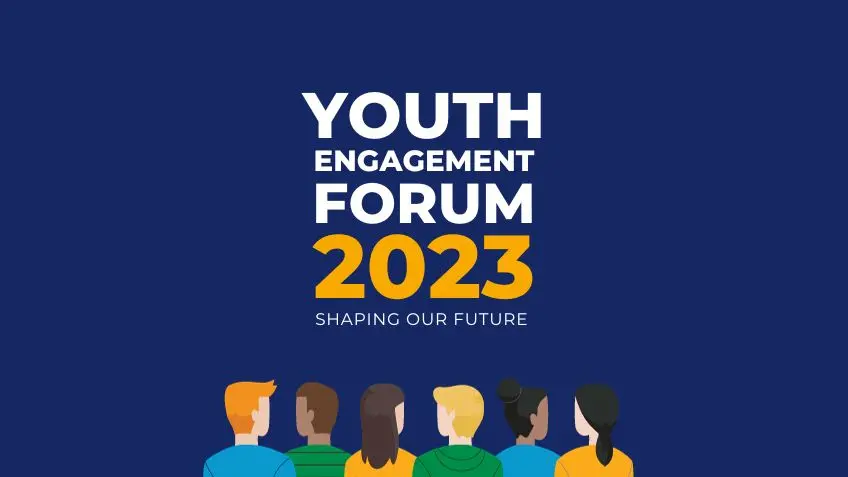Shaping Our Future: Reflections on the 2023 Youth Engagement Forum
The NDC Partnership hosted its third annual Youth Engagement Forum (YEF): Shaping Our Future this July, holding four rich and diverse sessions for a wide range of participants from across the entire Partnership network. The YEF provides a platform to equip global youth climate leaders with tools, networks, and experiences to lead on local NDC action. Speaker and UN Secretary General Youth Adviser on Climate Change, Jevanic Henry, noted events like the YEF allow for “mutual exchange which is so critical to climate action”, offering a space to reflect on current leadership and innovation while sparking ideas for the future.
Representatives from the NDC Partnership Co-Chairs, Rwanda and the United Kingdom (UK), opened each of the Forum’s four sessions, taking the time to highlight the important role of youth in powering climate action. Graham Stuart MP, Minister of State in the Department of Energy Security and Net Zero in the UK encouraged participants, stating, “You are the future of this planet – you have the passion, the drive, and the innovation to accelerate our crucial work.” Jeanne d’Arc Mujawamariya, Minister of the Environment of Rwanda, noted the importance of Rwanda’s youth in climate action, sharing that, “Governments and decision-makers need to create stronger enabling environments and secure financing to complement youth’s organization, energy and ideas to meet the global challenge and ensure effective and lasting solutions.”
Through dedicated sessions in English, French and Spanish, 575 participants from 100+ countries exchanged their experiences, challenges and climate action success stories. This year, the event was supported by YOUNGO NDC Working Group who led 20+ interactive breakout rooms and created space for participants to think outside their day-to-day roles. In addition, 15 partners led teach-in sessions, providing training and the opportunity for participants to engage with experts. For more information on speakers, teach-in session hosts and YEF 2023 planning partners, please visit ndcpartnership.org/YEF2023
Through the events, speakers and participants shared practical insights to re-define meaningful youth engagement. The varied sessions offered many takeaways, three of which are highlighted here:
- Youth climate leaders continue to request formal roles in policy development – and they require training, capacity building and consistent support to participate fully in these spaces.
Mr. Mohamed Zmerli, National Focal Point to UNFCCC in Tunisia, shared the experience of a group of young climate negotiators representing their country in recent COP proceedings. This type of inclusion is needed in many more countries and should be accompanied by intensive training for young negotiators around key international frameworks, priority themes for countries and communication skills. Mr. Zagy Yakana Berian, Founder of Society of Renewable Energy in Indonesia, spoke of coordination meetings with his government ahead of key events, noting that, “One thing that is very important – for youth to ensure we are in contact with our government officials, to keep pushing forward activities for more youth collaboration.” Mr. Arturo Jiménez, Climate Justice Focal Point in Colombia’s Ministry of Environment and Sustainable Development, shared how critical engagement must be initiated at the start of a process to fully involve youth and ensure a diversity of youth voices in shaping climate policy.
- In addition to financial resources and access to climate finance, youth leaders seek mentorship and guidance to scale initiatives in ways that make sense for them and their communities.
As discussed in the 2022 Youth Engagement Forum, a lack of climate finance continues to be a significant barrier to global progress, including youth-led projects. Ms. Falmata Mahamat Kana Bady, Communications Officer for International Student Environment Coalition in Chad, reflected on the many “youth who have talent, potential, and ideas but they do not have the means, whether financial or technical, to carry out their projects.” Ms. Vilma Alfú, Climate Action Department Head in the Ministry of Environment Panama, noted Panama’s experience in sharing knowledge on climate finance and how to develop projects with local youth leaders. “It is important”, noted Ms. Alfú, “to provide information on different options for financing […] which institutions offer funding, and who is within reach.” With emphasis placed on appropriate capacity building and access to finance, others can follow examples shared to support young people, even those in situations of vulnerability, to become agents of change and leaders of climate projects.
- Climate change education is needed at all levels, as well as opportunities to utilize learnings in sustainable, climate-focused employment opportunities.
Climate change education curricula, environmental integration and capacity building for educators are necessary tools to equip young people with knowledge to act on the climate emergency. Ms. Jeannette Larue, Director General of Public Education and Community Outreach Division at the Ministry of Agriculture, Climate Change & Environment in Seychelles, shared successful experiences in investing in climate curricula in schools nation-wide. She noted, “We are currently seeing the results of the foundation we started some time ago, and this is evidenced by young people who grew up learning about climate impacts now participating in international negotiations on behalf of Seychelles.” Despite some progress, young people routinely face challenges finding and identifying opportunities to bring this knowledge into the workforce. In many cases, youth climate leaders are pressed to accept volunteer positions, face a lack of awareness around positions in climate, energy and sustainable development sectors, or reside in areas where job opportunities are limited. Multiple conversations in breakout rooms and teach-ins, such as the session led by Student Energy, centered around opportunities to turn existing passion and climate knowledge into meaningful careers.
Summing up the central theme of this year’s Youth Engagement Forum, Ms. Giulia Jacovella, Youth Empowerment and Climate Analyst at UNDP, said it best by remarking that, “Meaningful youth participation is about expanding the scope for young people to engage and share in levels of climate governance.”
To hear more takeaways, watch the video recordings from each session on the NDC Partnership’s YouTube channel and follow #YouthWave in the coming months.
Stay tuned for more information about YEF2024!
